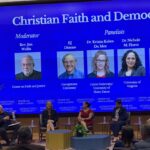IRD President Mark Tooley recently wrote on the rise of non denominationalism in America. There, he cites Christianity Today’s finding that “There are six times more nondenominational churches than there are Episcopal congregations, and five times more than Presbyterian Church (USA). If nondenominational were a denomination, it would even be larger than the Southern Baptist Convention, the largest denomination in the US.”
Non denominational churches, broadly speaking, can be defined as congregations that are not tied to a larger body that governs and oversees individual congregations. Moreover, because of their independent status, many non denominational churches, especially “megachurches”, do not have a church membership structure in place, unlike congregations in the Presbyterian and Anglican denominations. The autonomous nature of non denominationalism, both from the perspective of churches and church attendees, can be theologically disputed. However, it also poses a threat to the principle of separation of church and political power that our judicial system has long recognized and sought to respect.
The Supreme Court’s jurisprudence on ecclesiastical matters has been open-and-shut leading up to the rise of non denominationalism. Put simply, the Court has repeatedly decided against intervening in intra-church disputes and disagreements, for if the Court were to intervene, it would have to speak on theological and doctrinal matters and intrude into the church’s affairs. While not explicitly formulated in our founding documents, the Court has opted to distinguish their jurisdiction with the jurisdiction of the church, essentially endorsing a principle of separating the church from political power and influence. Additionally, the Establishment and Free Exercise Clauses of the First Amendment provide additional endorsement of separating the church from the civil courts.
In the seminal 1871 Watson v. Jones case, the Court said that “whenever the questions of discipline, or of faith, or ecclesiastical rule, custom, or law have been decided by the highest of [the] church judicatories to which the matter has been carried, the legal tribunals must accept such decisions as final, and as binding on them.”
A century later, in Serbian Eastern Orthodox Diocese v. Milivojevich, the Supreme Court held that the First Amendment “permit[s] hierarchical religious organizations to establish their own rules and regulations for internal discipline and government, and to create tribunals for adjudicating disputes over these matters.” From this holding, the Court has ruled that the judiciary cannot resolve ecclesiastical disputes without offending the church’s First Amendment rights.
Considering the Court’s relatively straightforward jurisprudence on church-related disputes, how does non denominationalism throw a wrench in the Court’s ecclesiastical jurisprudence? Two things. First, the non denominational movement lacks a higher governing body, or in the Court’s words in Watson and Milivojevich, tribunals. Each non denominational church is fully autonomous; there are no higher tribunals in non denominational churches that can resolve intra-church disputes. Thus, if an attendee at a non denominational church files a tort claim or a property complaint against the non denominational church, who will step in and formally resolve the dispute if not the civil courts?
In the Presbyterian, Anglican, and Roman Catholic traditions, there are tribunals in the tradition to keep the civil courts from needing to intervene in theological disputes. Unfortunately, non denominational churches do not have an analogous institution to resolve disputes by themselves.
Further, due to their autonomous nature as applied to congregations, church membership is also more rare in non denominational circles, especially when addressing larger non denominational churches. The Court in Milivojevich, along with earlier cases regarding ecclesiastical matters, clarified that Milivojevich was seeking to challenge his church under the status of a member. The Court there held that civil courts have no jurisdiction to resolve matters “which concerns theological controversy, church discipline, ecclesiastical government, or the conformity of the members of the church to the standard of morals required of them.” Does the Court’s deference to the church only applies when members file suit against the congregation? What happens when a non-member sues a church he attended for tortious liability or another complaint?
In 2019, the Supreme Court of Oklahoma answered this question in their controversial holding in Doe v. Presbyterian Church U.S.A. of Tulsa, Oklahoma. In that case, Doe was baptized in the specific church as a non-member, then later moved to Syria. The Syrian government caught wind of his baptism in Oklahoma and persecuted him on that basis. Doe filed suit against the church for publicizing his baptism despite his wishes for the sacrament to be administered privately.
While the district court said that they did not have jurisdiction to resolve Doe’s complaint, the Oklahoma Supreme Court said otherwise: the lower trial court had subject matter jurisdiction to hear the merits because Doe was not a member of the Presbyterian Church. The Court argued that the Religious Autonomy Doctrine that churches typically enjoy do not protect churches from judicial evaluation in disputes with attending non-members.
The Supreme Court declined to hear the Tulsa Presbyterian Church’s appeal, thus the big question still looms large. In an America with a growing number of autonomous congregations that do not profess a denomination and where formal church membership is in decline, how will legal intra-church disputes be resolved without hierarchical governing bodies in the church? The answer unfortunately perhaps is an increased frequency of civil courts stepping into the theological ring and as a result, blurring the lines between adjudication of disputes and establishment or endorsement of religious doctrine.






Comment by David Mu on August 4, 2023 at 11:31 pm
Let’s hope the courts decide to stay as far from Non denominational churches as good sense allows – as indeed shall I. Christianity as organized object is indeed an non-denominated one in this nation, but I think look-out as fresh forms of conflict arises (as it always does) between this and that faction ‘knowing’ they have the ‘truth’. Also, what mess will come when sexual abuse is afoot…
The wisdom of Solomon shall be needed to bring order to those storms.
Comment by c on August 5, 2023 at 6:17 pm
Then there is the situation in which a church has a succession problem, especially if there is family involved as well as the church itself (ie. the board).
An example of this is Jericho City of Praise in Landover, MD, which was founded in the 1950s in DC and grew so large it has a 100-acre campus; the church’s parking lot gets used for events at neighboring FedEx Field. After the founding couple passed away, things went haywire and it took over three years of court action in Maryland and DC to get the disputes resolved. When the dust settled, there were three churches: Jericho City of Praise, which was restored to the founders’ son who had been ousted from the pulpit by the board of trustees; Jericho Baptist church, under the auspices of that board of trustees; and the church started by the pastor whom the board appointed to replace the son and had been litigated out of a job.